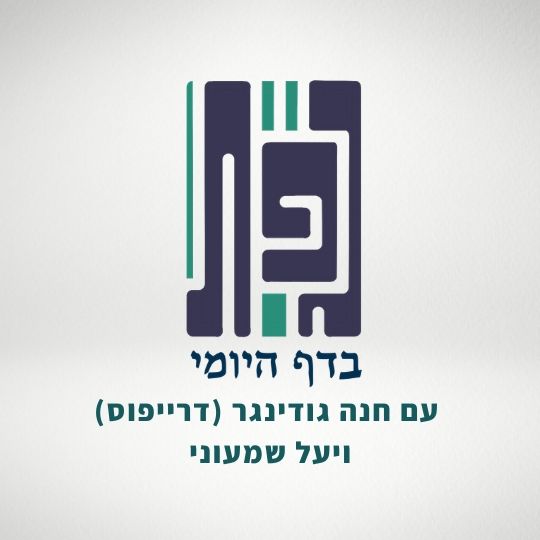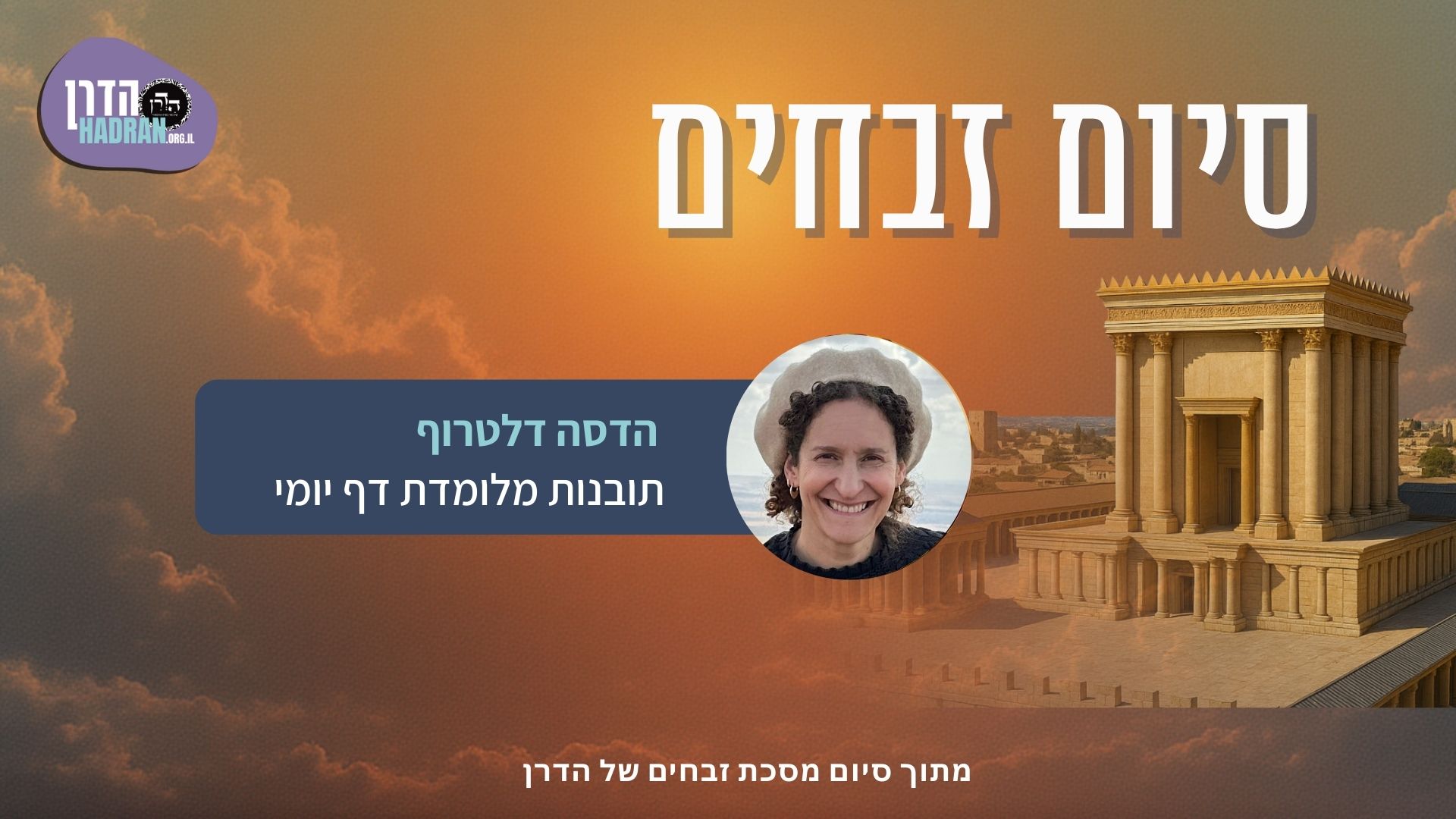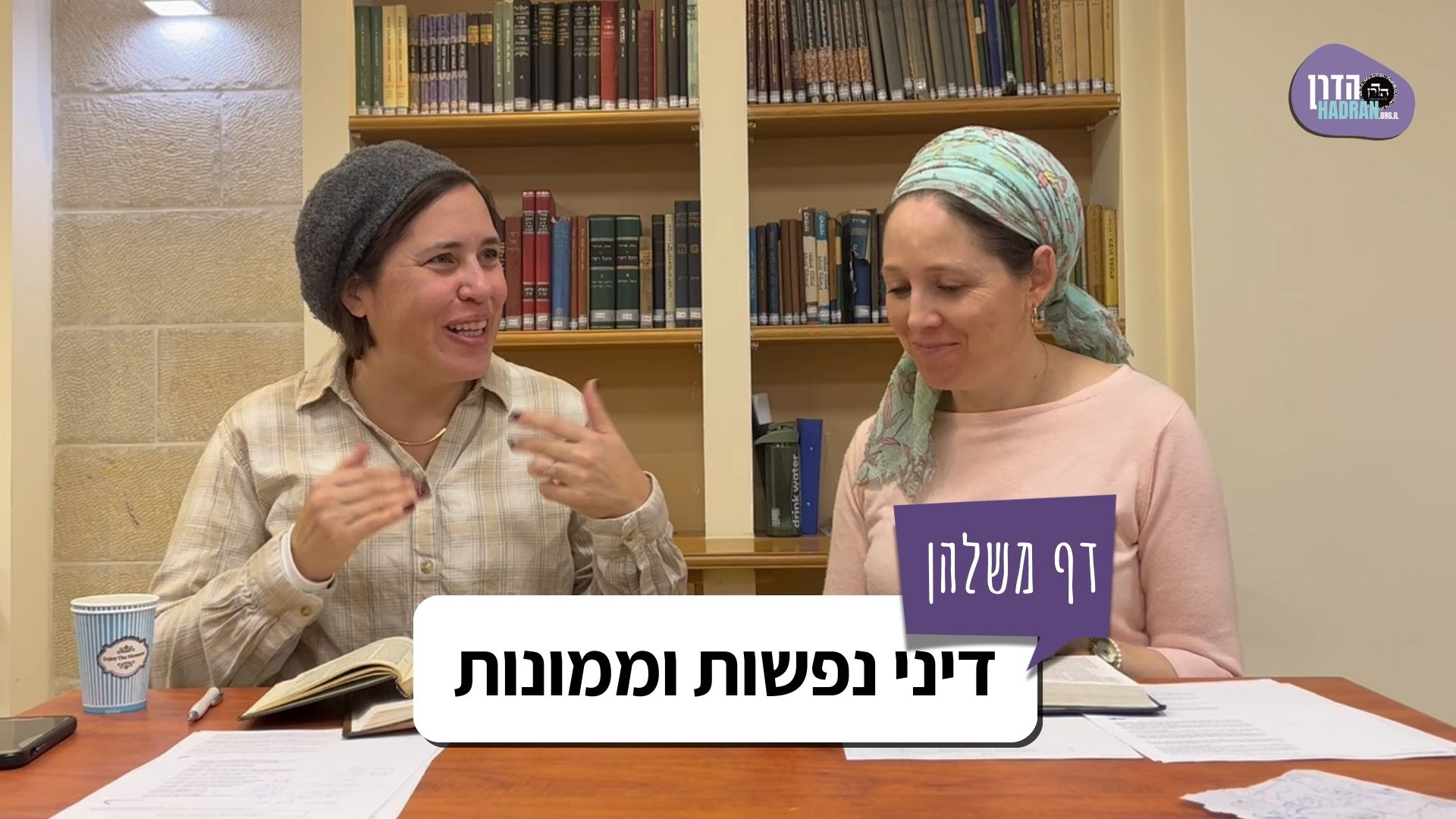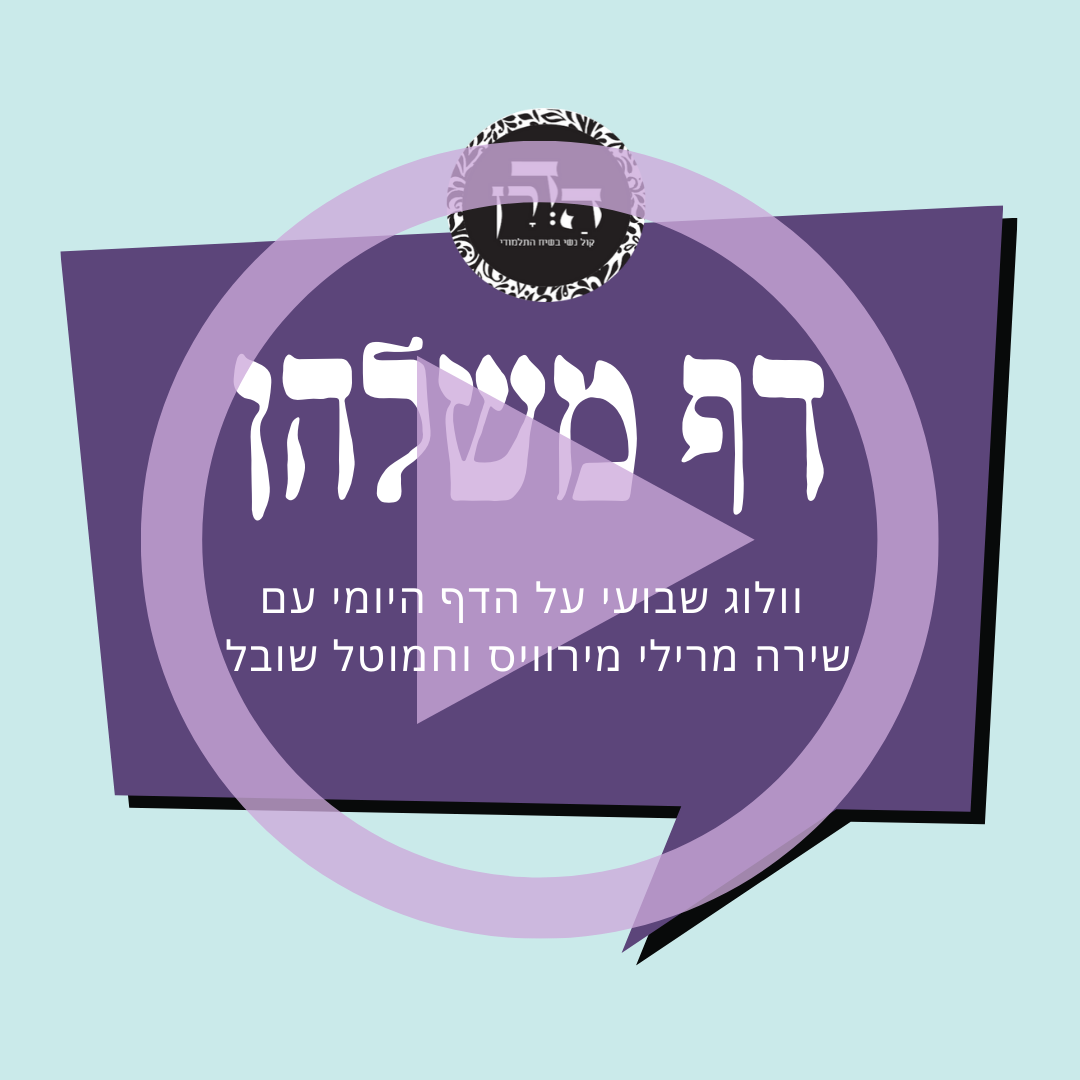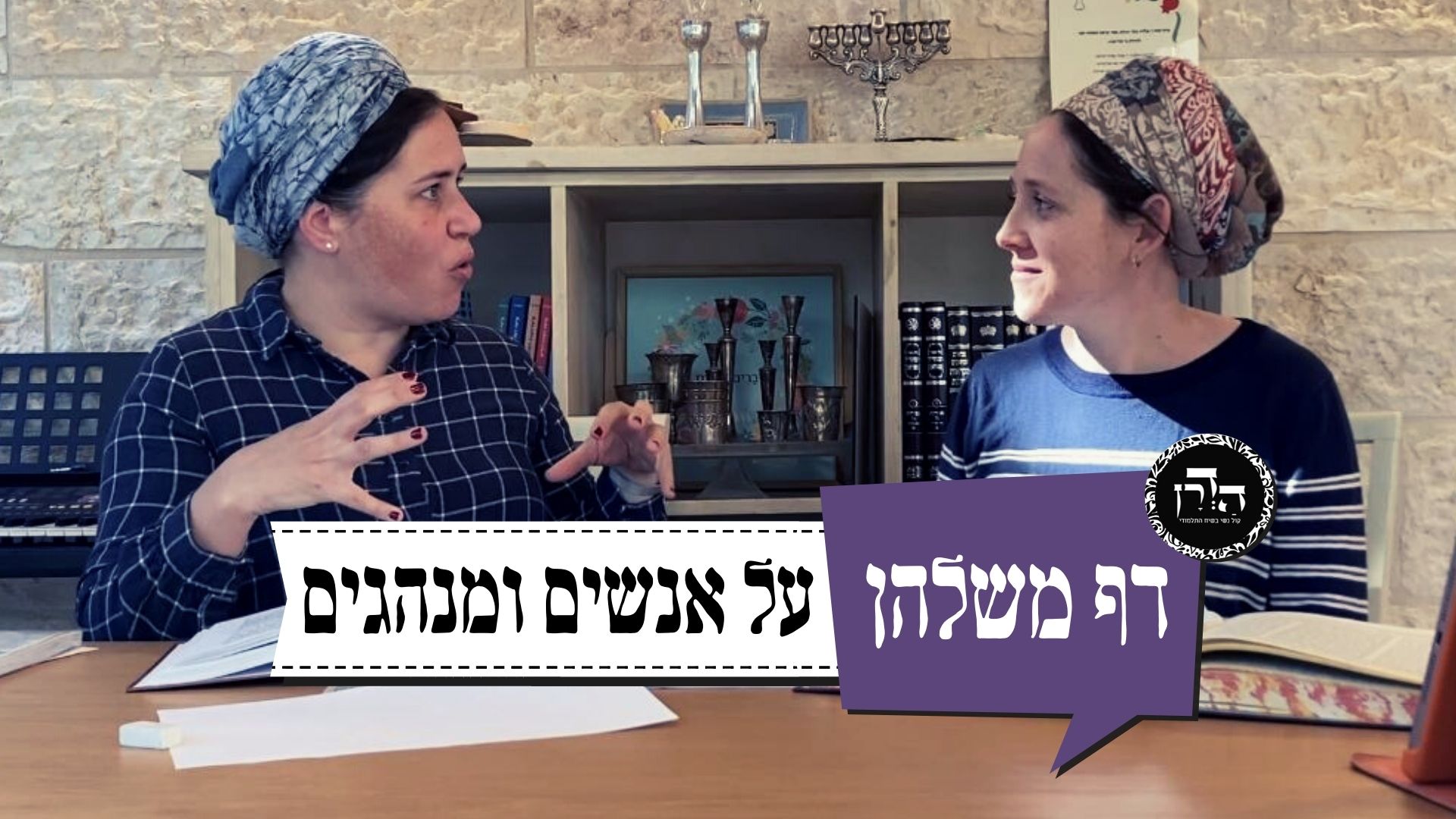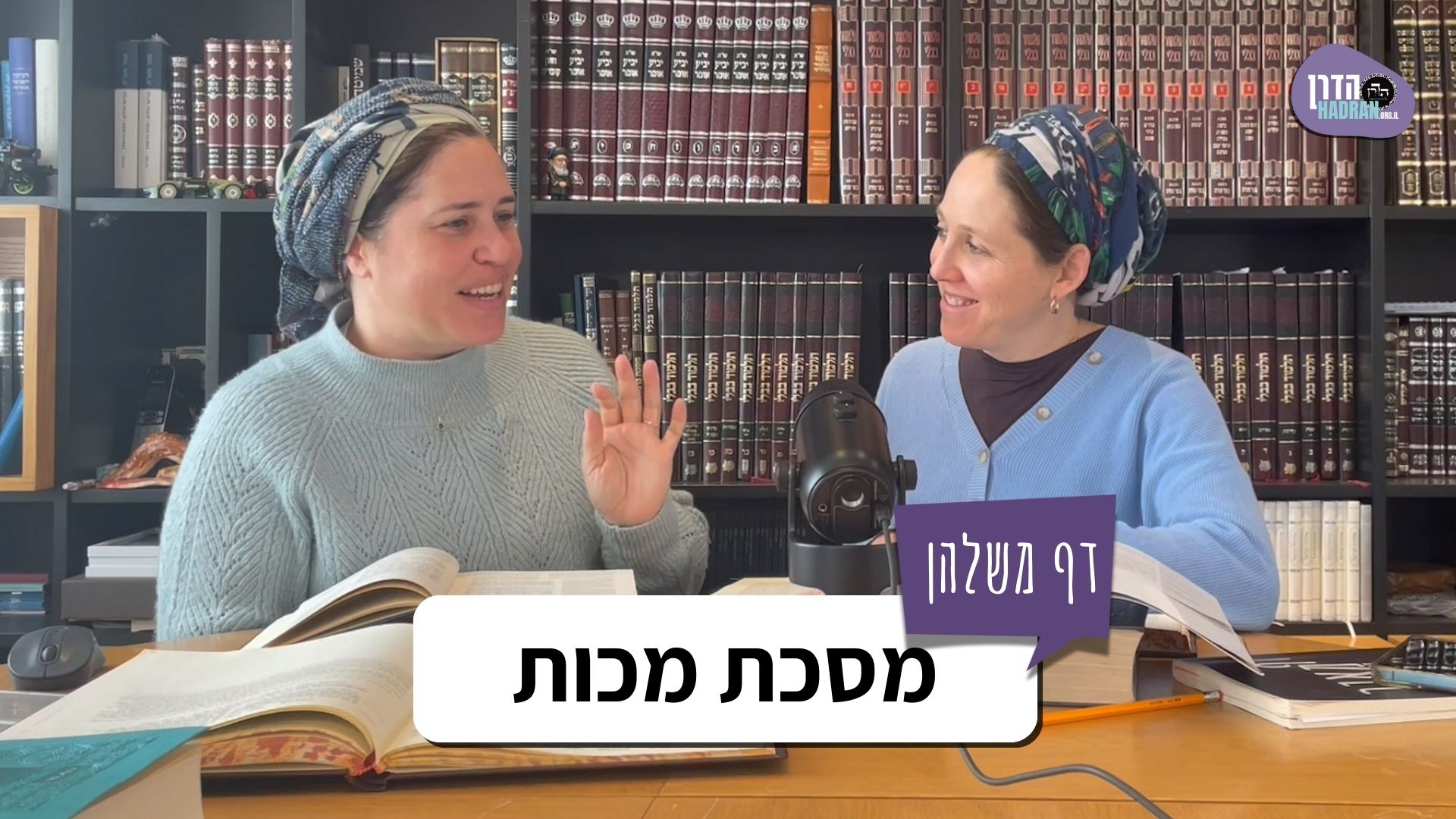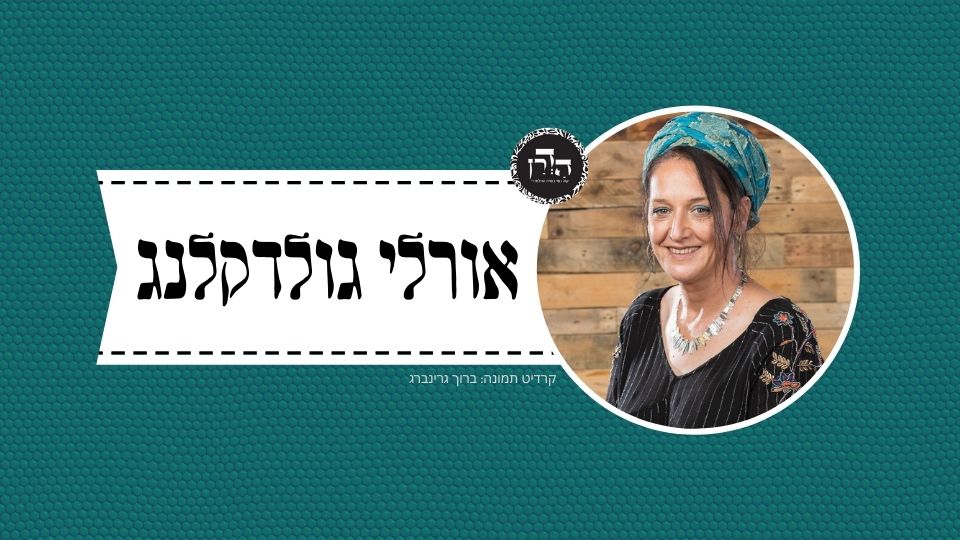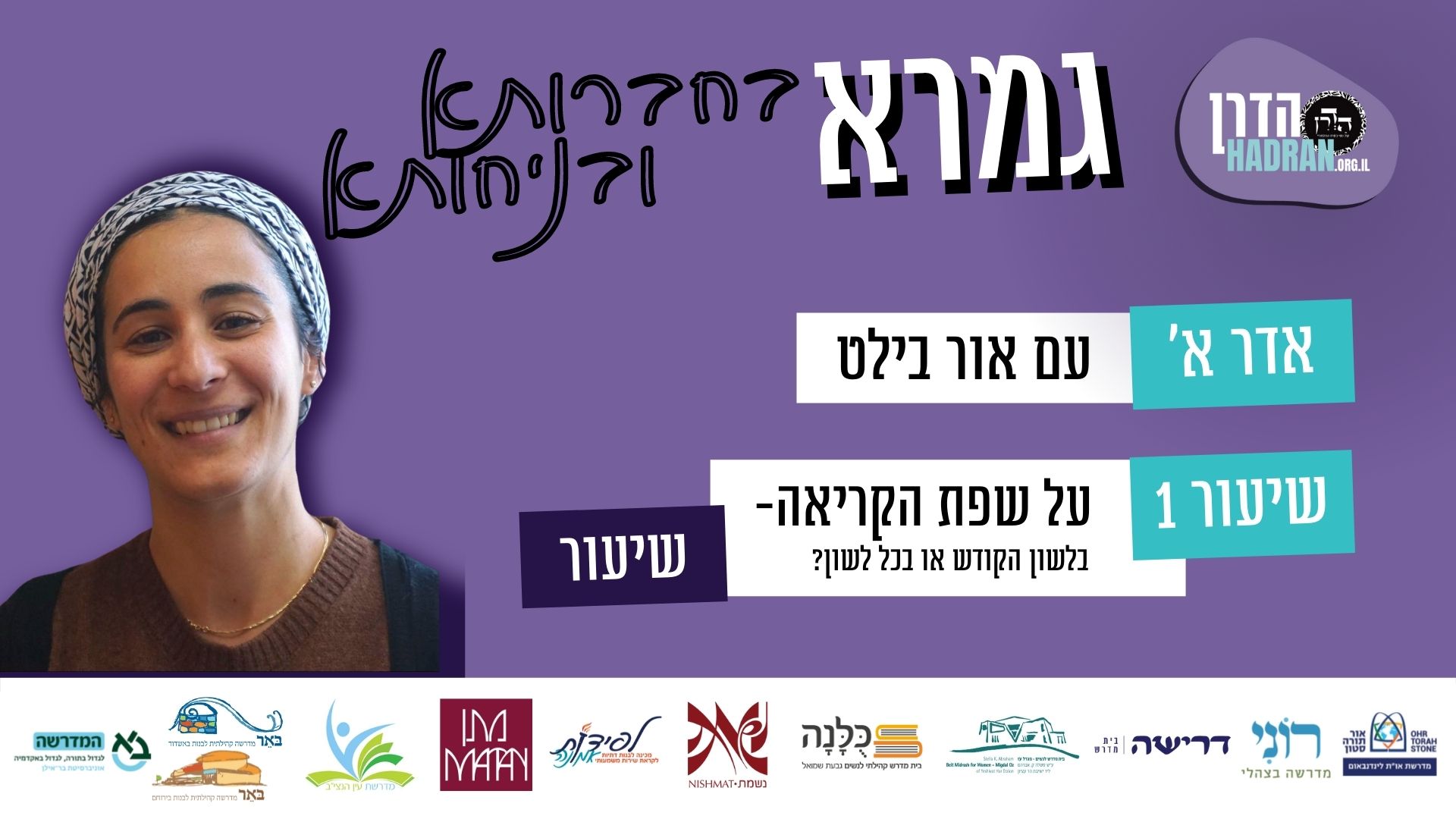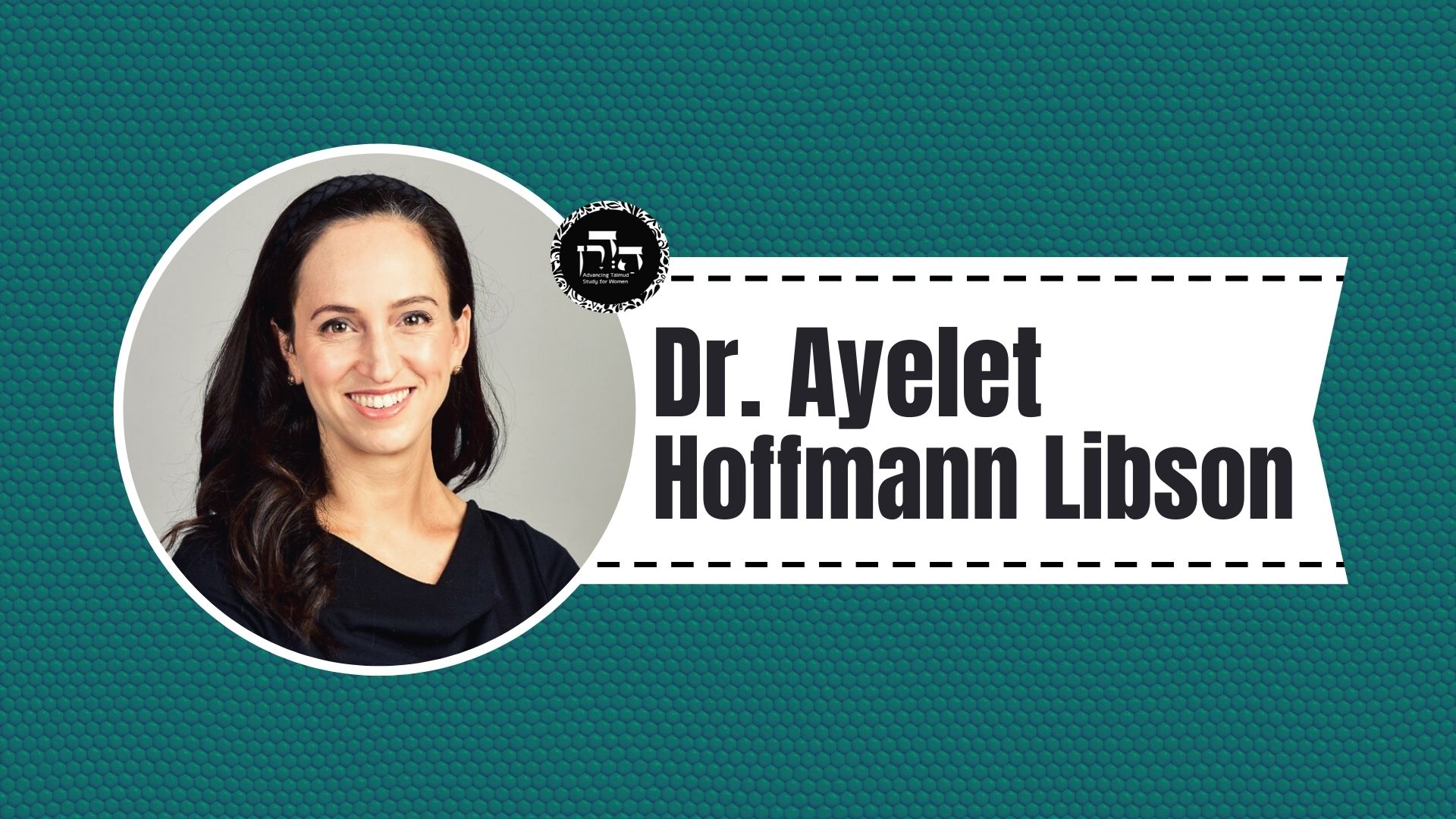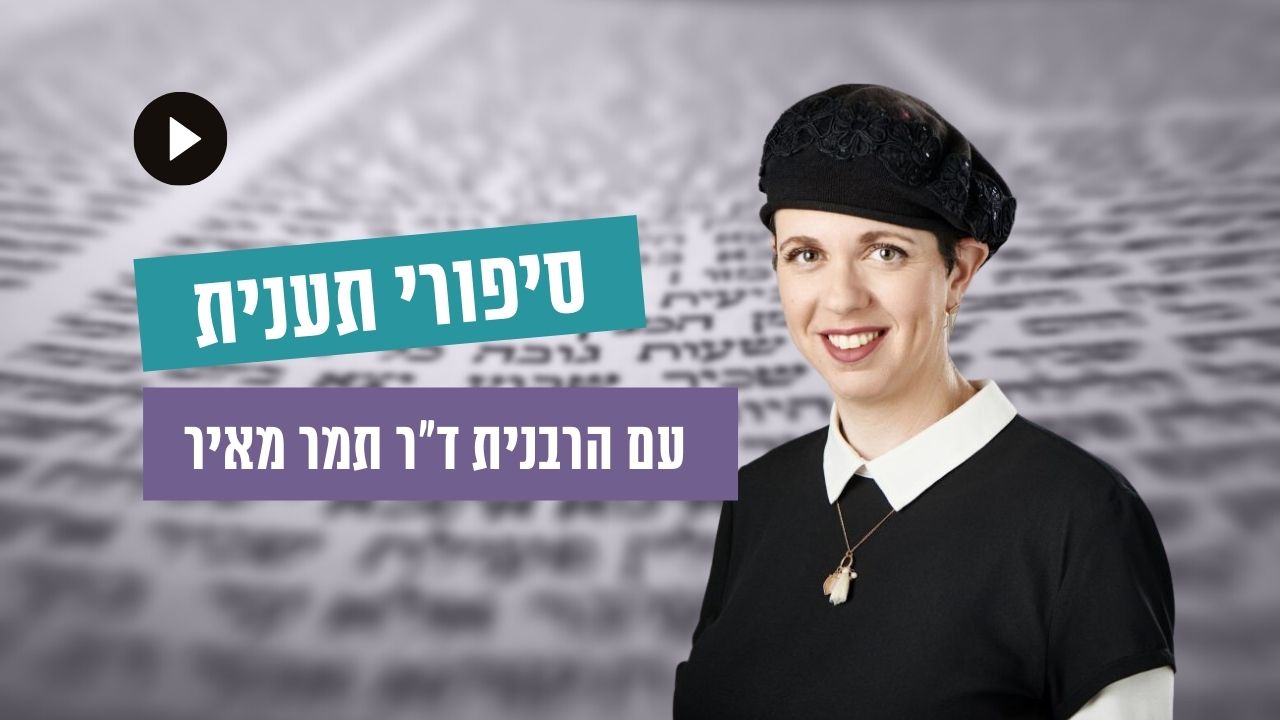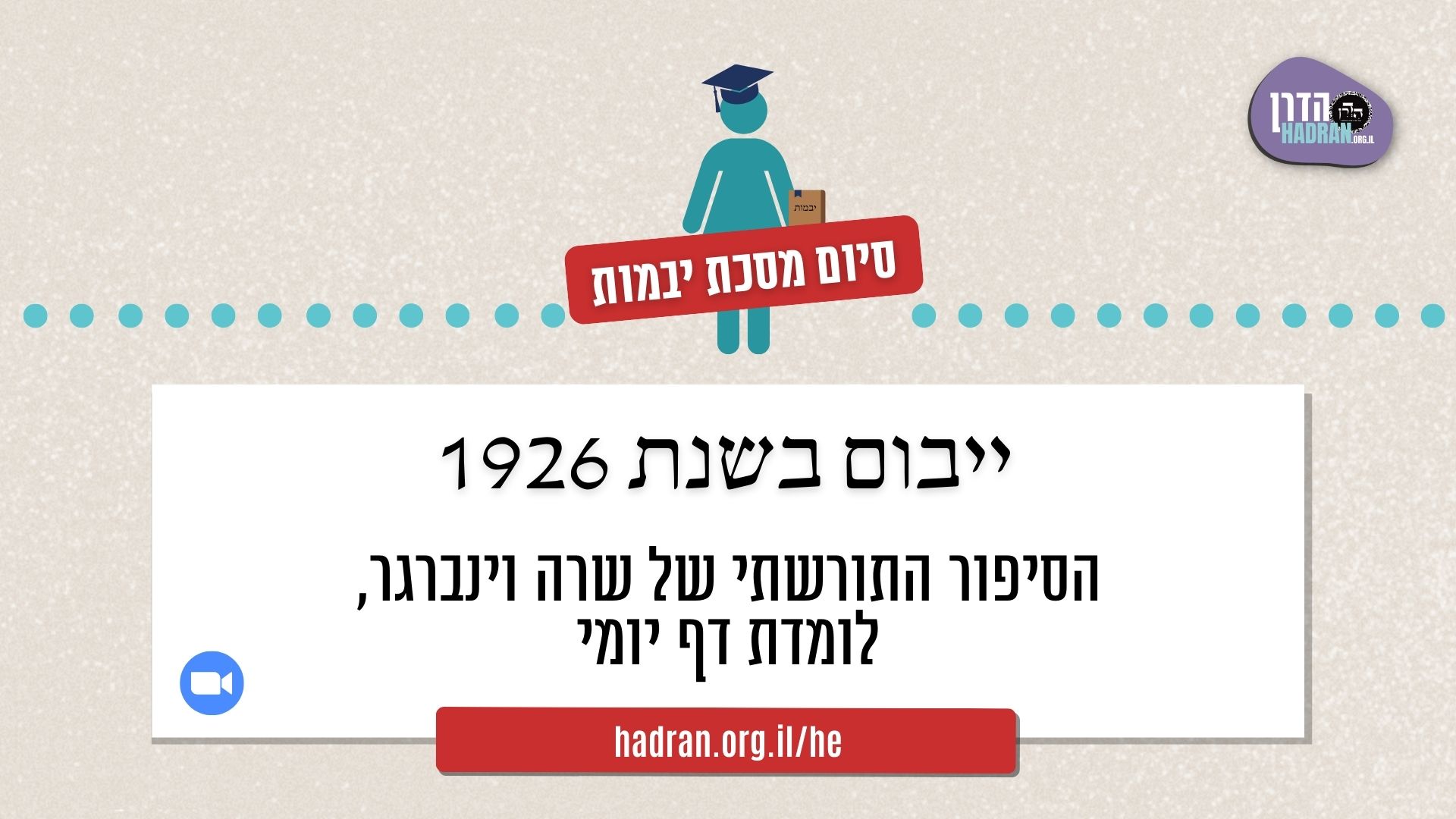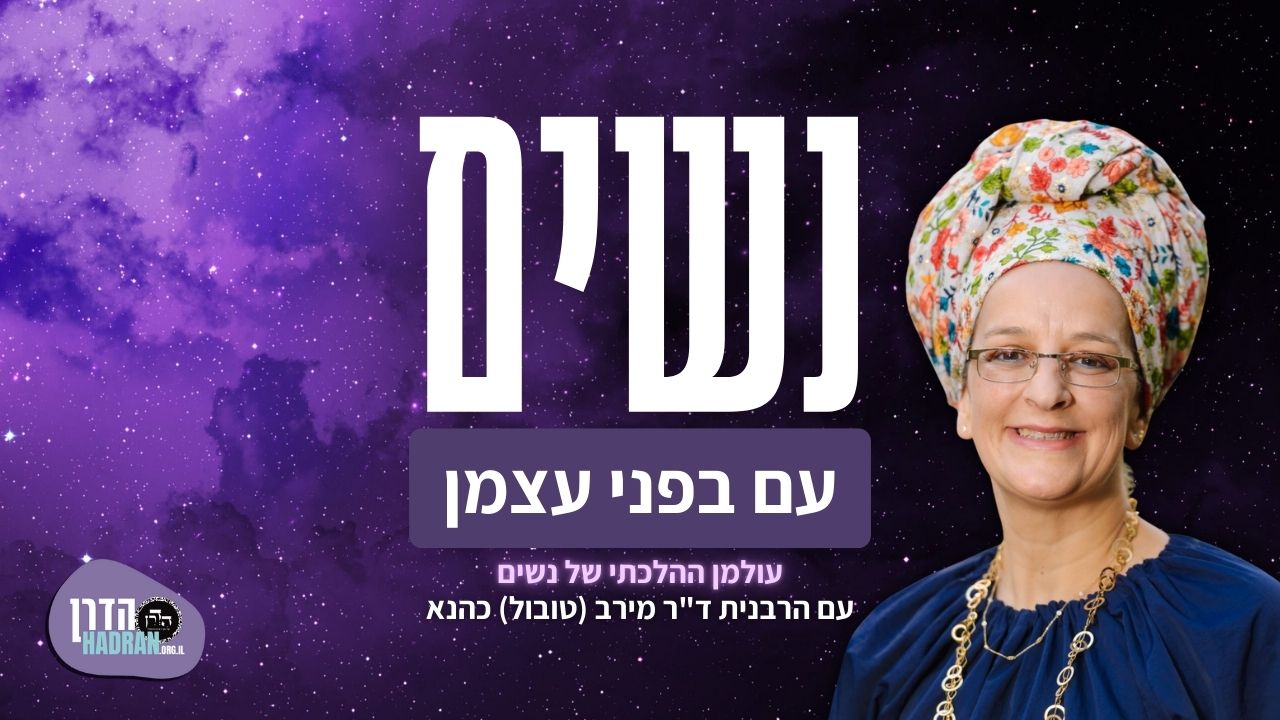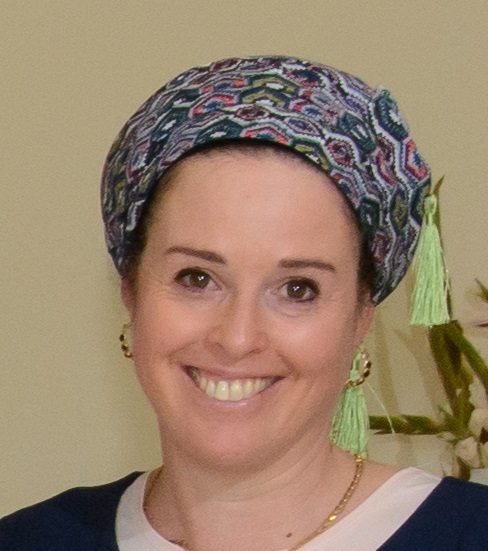האם לוקים על לאו שאין בו מעשה? האם לוקים על לאו הניתק לעשה? האם תמורה נחשב לאו הניתק לעשה?
רוצה להקדיש שיעור?
כלים
העמקה
רוצה להבין מה באמת קורה מתחת לפני השטח של הסוגיה?
שיעורים, פודקאסטים והרחבות של מיטב המורות שלנו יפתחו לך עוד זוויות וכיווני חשיבה.
חדשה בלימוד הגמרא?
זה הדף הראשון שלך? איזו התרגשות עצומה! יש לנו בדיוק את התכנים והכלים שיעזרו לך לעשות את הצעדים הראשונים ללמידה בקצב וברמה שלך, כך תוכלי להרגיש בנוח גם בתוך הסוגיות המורכבות ומאתגרות.
פסיפס הלומדות שלנו
גלי את קהילת הלומדות שלנו, מגוון נשים, רקעים וסיפורים. כולן חלק מתנועה ומסע מרגש ועוצמתי.
תמורה ד
לָא מָצֵית אָמְרַתְּ, דִּכְתִיב ״לֹא תְקַלֵּל חֵרֵשׁ״, וְאִי אָמְרַתְּ בִּשְׁלָמָא לְקַלֵּל אֶת חֲבֵירוֹ — אַזְהַרְתֵּיהּ מֵהָכָא דִּכְתִיב ״לֹא תְקַלֵּל חֵרֵשׁ״, אֶלָּא אִי אָמְרַתְּ מוֹצִיא שֵׁם שָׁמַיִם לְבַטָּלָה — אַזְהַרְתֵּיהּ מֵהֵיכָא?
The Gemara responds: You cannot say that Deuteronomy 28:59 is referring to one who pronounces the name of Heaven in vain, as it is written: “You shall not curse the deaf” (Leviticus 19:14), which prohibits all curses, even those using God’s name. Granted, if you say that Deuteronomy 28:59 is referring to cursing another, one can say that the separate warning of punishment for this prohibition is from here, as it is written: “You shall not curse the deaf.” One verse articulates the prohibition, and the other indicates liability for punishment. But if you say that Deuteronomy 28:59 is referring to pronouncing the name of Heaven in vain, from where is the warning of this prohibition? A prohibition requires two verses to include liability for punishment.
אַלְּמָה לָא? וְהָכְתִיב: ״אֶת ה׳ אֱלֹהֶיךָ תִּירָא וְאֹתוֹ תַעֲבוֹד״! הָהוּא אַזְהָרַת עֲשֵׂה הוּא.
The Gemara counters: Why not, i.e., what is the difficulty? But isn’t it written: “You shall fear the Lord your God, and Him you shall serve” (Deuteronomy 6:13)? Fearing God certainly includes not pronouncing His name in vain, and this verse can therefore serve as the warning. The Gemara answers: That verse is a warning stated as a positive mitzva. In order to qualify as a warning, the verse must prohibit, not command.
מִשּׁוּם רַבִּי יוֹסֵי בְּרַבִּי חֲנִינָא אָמְרוּ: אַף הַמַּקְדִּים תְּרוּמָה לְבִיכּוּרִים. מַאי טַעְמָא דְּרַבִּי יוֹסֵי בְּרַבִּי חֲנִינָא? אָמַר קְרָא: ״מְלֵאָתְךָ וְדִמְעֲךָ לֹא תְאַחֵר״ — ״מְלֵאָה״ אֵלּוּ בִּיכּוּרִים, ״וְדִמְעֲךָ״ אֵלּוּ תְּרוּמָה, וְאָמְרַתְּ ״לֹא תְאַחֵר״.
§ It was stated (3a): They said in the name of Rabbi Yosei, son of Rabbi Ḥanina: Also one who separates teruma prior to the separation of the first fruits is liable to be flogged. The Gemara explains: What is the reason for the prohibition mentioned by Rabbi Yosei, son of Rabbi Ḥanina? The verse states: “You shall not delay to offer of the fullness of your harvest and the outflow of your presses” (Exodus 22:28). When the verse states: The fullness of the harvest, these are the first fruits; and when the verse states: “And the outflow of your presses,” this is teruma. And the verse says: “You shall not delay,” i.e., do not delay the separation of the first fruits by separating teruma beforehand.
אִיתְּמַר: הִקְדִּים תְּרוּמָה לְבִיכּוּרִים, רַבִּי אֶלְעָזָר וְרַבִּי יוֹסֵי בְּרַבִּי חֲנִינָא, חַד אָמַר: לוֹקֶה, וְחַד אָמַר: אֵינוֹ לוֹקֶה. תִּסְתַּיֵּים דְּרַבִּי יוֹסֵי בְּרַבִּי חֲנִינָא הוּא דְּאָמַר לוֹקֶה, מִדְּאָמַר רַבִּי יוֹסֵי בְּרַבִּי חֲנִינָא: אַף הַמַּקְדִּים תְּרוּמָה לְבִיכּוּרִים לוֹקֶה.
It was stated: If one separated teruma prior to the separation of the first fruits, Rabbi Elazar and Rabbi Yosei, son of Rabbi Ḥanina, disagreed. One said that he is flogged, and one said that he is not flogged. The Gemara suggests: It may be concluded that it is Rabbi Yosei, son of Rabbi Ḥanina, who said that he is flogged, from the fact that Rabbi Yosei, son of Rabbi Ḥanina, said earlier: Also one who separates teruma prior to the separation of the first fruits is flogged.
אַדְּרַבָּה, תִּסְתַּיֵּים דְּרַבִּי אֶלְעָזָר הוּא דְּאָמַר לוֹקֶה, דִּתְנַן: הָיוּ לְפָנָיו שְׁתֵּי כַּלְכַּלּוֹת שֶׁל טֶבֶל, וְאָמַר: ״מַעֲשֵׂר שֶׁל זוֹ בָּזוֹ״ — הָרִאשׁוֹנָה מְעוּשֶּׂרֶת.
The Gemara suggests: On the contrary, it may be concluded that it is Rabbi Elazar who said that he is flogged, as we learned in a mishna (Demai 7:6): If two baskets of untithed produce were before someone, and he said: The tithe of this basket is in that basket, then the produce of the first basket is thereby tithed. And when he separates sufficient tithe from the second basket to exempt both baskets, the produce of the second basket will be considered tithed as well.
״שֶׁל זוֹ בָּזוֹ וְשֶׁל זוֹ בָּזוֹ״ — הָרִאשׁוֹנָה מְעוּשֶּׂרֶת, וְהַשְּׁנִיָּה אֵינָהּ מְעוּשֶּׂרֶת. ״מַעַשְׂרוֹתֵיהֶם מַעְשַׂר כַּלְכַּלָּה בַּחֲבֶירְתָּהּ״ — קְרָא אֶת הַשֵּׁם.
If he said: The tithe of this basket is in that basket, and the tithe of that basket is in this basket, the produce of the first basket is tithed, as stated, but the produce of the second basket is not tithed. Since the produce of the first basket had just been tithed, it could not be used to tithe the second, since the tithe may be separated only from untithed produce. If he said: Their tithes should be separated as tithe, each basket in the other, he has declared the assignation of tithe concurrently, and the produce of both baskets is thereby tithed.
וְאִתְּמַר, רַבִּי אֶלְעָזָר אָמַר: לוֹקֶה, מִפְּנֵי שֶׁהִקְדִּים מַעֲשֵׂר שֵׁנִי שֶׁבָּהּ לְמַעֲשֵׂר רִאשׁוֹן שֶׁבַּחֲבֶירְתָּהּ. תִּסְתַּיֵּים.
And it was stated with regard to the first clause of that mishna that Rabbi Elazar said: He is flogged, because he separated the second tithe of the produce of the first basket prior to the separation of the first tithe of the other basket. One must always separate tithes in order, the first tithe before the second tithe. If Rabbi Elazar holds that one is flogged for separating tithes in the wrong order, he presumably also holds that one is flogged for separating teruma before first fruits. The Gemara affirms: It may be concluded that Rabbi Elazar is the one who said he is flogged.
אֶלָּא רַבִּי יוֹסֵי בְּרַבִּי חֲנִינָא, דְּאָמַר אֵינוֹ לוֹקֶה, לֵימָא קַשְׁיָא דְּרַבִּי יוֹסֵי בְּרַבִּי חֲנִינָא אַדְּרַבִּי יוֹסֵי בְּרַבִּי חֲנִינָא!
The Gemara asks: But if that is so, it follows that it is Rabbi Yosei, son of Rabbi Ḥanina, who said that he is not flogged. Shall we say then that the statement of Rabbi Yosei, son of Rabbi Ḥanina, here poses a difficulty to the earlier statement of Rabbi Yosei, son of Rabbi Ḥanina, that one who separates teruma before separating first fruits is flogged?
לָא, רַבִּי יוֹסֵי בְּרַבִּי חֲנִינָא
The Gemara answers: No, when Rabbi Yosei, son of Rabbi Ḥanina, stated simply: Even one who separates teruma prior to the separation of the first fruits,
אַפְּטוּרָא קָאֵי, וְהָכִי קָאָמַר: לָאו שֶׁאֵין בּוֹ מַעֲשֶׂה אֵין לוֹקִין עָלָיו. מִשּׁוּם רַבִּי יוֹסֵי בְּרַבִּי חֲנִינָא אָמְרוּ: אַף הַמַּקְדִּים תְּרוּמָה לְבִיכּוּרִים.
he was referring not to liability for lashes, but to the exemption from lashes stated in the name of Rabbi Yoḥanan (3a). And this is what he is saying: One is not flogged for transgressing a prohibition that does not involve an action…They said in the name of Rabbi Yosei, son of Rabbi Ḥanina, that also one who separates teruma prior to the separation of the first fruits is not flogged, since he performs no action.
וּמַאי שְׁנָא מֵימֵר דְּלָקֵי, מִשּׁוּם דִּבְדִיבּוּרוֹ עָשָׂה מַעֲשֶׂה? מַקְדִּים תְּרוּמָה לְבִיכּוּרִים נָמֵי לִילְקֵי, מִשּׁוּם דִּבְדִיבּוּרוֹ עָשָׂה מַעֲשֶׂה!
The Gemara asks: And what is different about one who effects substitution, that he is flogged despite not having performed an action? Is it because he has performed an action with his speech, by consecrating the animal? If so, one who separates teruma prior to the separation of the first fruits should be flogged as well, because he has performed an action with his speech, by consecrating the produce.
אָמַר רַבִּי אָבִין: שָׁאנֵי הָתָם, דְּלָאו שֶׁנִּיתָּק לַעֲשֵׂה הוּא, דִּכְתִיב: ״מִכֹּל מַעְשְׂרוֹתֵיכֶם תָּרִימוּ״.
Rabbi Avin said: It is different there, in the case of one who tithes produce in the wrong order, as it is a prohibition whose violation can be rectified by fulfilling a positive mitzva. As a rule, if the Torah specifies a positive mitzva to be performed after transgressing a prohibition to rectify it, that prohibition does not carry a punishment of lashes. This is the case here, as it is written: “Out of all of your tithes you shall set apart all of that which is due to the Lord” (Numbers 18:29), which teaches that one who separated tithes in the incorrect order or who separated teruma before separating the first fruits, must still separate the earlier tithes even after the later tithes, or the first fruits even after the teruma.
יָתֵיב רַב דִּימִי וְקָאָמַר לַהּ לְהָא שְׁמַעְתָּא, אֲמַר לֵיהּ אַבָּיֵי: וְכֹל לָאו שֶׁנִּיתָּק לַעֲשֵׂה לָא לָקֵי?
§ Rav Dimi was sitting and saying this halakha, that one who separates teruma prior to separating the first fruits is not flogged because it is a prohibition whose violation can be rectified. Abaye said to him: And is it correct that one is not flogged for transgressing any prohibition whose violation can be rectified by fulfilling a positive mitzva?
וְהָא מֵימֵר, דְּלָאו שֶׁנִּיתָּק לַעֲשֵׂה הוּא, וְלָקֵי, דִּתְנַן: לֹא שֶׁאָדָם רַשַּׁאי לְהָמִיר, אֶלָּא שֶׁאִם הֵמִיר — מוּמָר, וְסוֹפֵג אֶת הָאַרְבָּעִים.
But there is the case of one who effects substitution, which is a prohibition whose violation can be rectified by fulfilling a positive mitzva, as the verse states: “He shall not exchange it, nor substitute it, a good for a bad, or a bad for a good; and if he shall at all change animal for animal, then both it and that for which it is changed shall be holy” (Leviticus 27:10). And even so, one who effects substitution is flogged, as we learned in the mishna (2a): That is not to say that it is permitted for a person to effect substitution; rather, it means that if one substituted a non-sacred animal for a consecrated animal, the substitution takes effect and the one who substituted the non-sacred animal incurs the punishment of the forty lashes.
הָוֵי לְהוּ תְּרֵי לָאוֵי וְחַד עֲשֵׂה, וְלָא אָתֵי חַד עֲשֵׂה וְעָקַר תְּרֵי לָאוֵי.
Rav Dimi answered: There are two prohibitions specified in the verse as transgressed by one who effects substitution: “He shall not exchange it,” and: “Nor substitute it.” But there is only one positive mitzva: “Both it and that for which it is changed shall be holy.” And one positive mitzva does not come and uproot two prohibitions. Therefore, although generally, one who transgresses a prohibition that can be rectified is not flogged, one who effects substitution is flogged.
וַהֲרֵי אוֹנֵס, דְּחַד לָאו וְחַד עֲשֵׂה, וְלָא אָתֵי חַד עֲשֵׂה וְעָקַר לָאו, דְּתַנְיָא: אוֹנֵס שֶׁגֵּירַשׁ — אִם יִשְׂרָאֵל הוּא מַחְזִיר וְאֵינוֹ לוֹקֶה, וְאִם כֹּהֵן הוּא לוֹקֶה וְאֵינוֹ מַחְזִיר!
The Gemara counters: But there is the case of the rapist who forces himself upon a virgin, who is obligated to marry the victim if she wishes and is then prohibited from divorcing her. As here the verse states one prohibition: “He may not send her away all his days,” and one positive mitzva: “And she shall be his wife” (Deuteronomy 22:29). This teaches that he can rectify the transgression of divorcing her by remarrying her. And yet, the one positive mitzva does not come and uproot the prohibition, as it is taught in a baraita: With regard to a rapist who married and then divorced his victim, if he is an Israelite, who is permitted to marry a divorcée, he remarries her and he is not flogged. But if he is a priest, who is prohibited from marrying a divorcée, he is flogged and he does not remarry her.
כֹּהֲנִים קָאָמְרַתְּ?! כֹּהֲנִים — טַעְמָא אַחְרִינָא הוּא, דְּרַבִּי רַחֲמָנָא קְדוּשָּׁה יַתִּירָא.
The Gemara answers: You say that a case that concerns priests challenges the principle that a rectifiable transgression does not make one liable for flogging. But in the case of priests there is another reason why they are flogged, as the Merciful One increased the severity of their transgressions, for they have greater holiness. By contrast, one who transgresses a prohibition unrelated to the priesthood will not be flogged if its violation can be rectified by fulfilling a positive mitzva.
כְּתַנָּאֵי: ״לֹא יַשְׁאִירוּ מִמֶּנּוּ עַד בֹּקֶר״ — בָּא הַכָּתוּב לִיתֵּן עֲשֵׂה אַחַר לֹא תַעֲשֶׂה, לוֹמַר שֶׁאֵין לוֹקִין עָלָיו, דִּבְרֵי רַבִּי יְהוּדָה.
§ Which prohibitions carry the punishment of lashes is subject to a dispute between tanna’im, as it is taught in a baraita: The verse states concerning the Paschal offering: “And you shall let nothing of it remain until the morning, but that which remains of it until the morning you shall burn with fire” (Exodus 12:10). The verse comes to place a positive mitzva after the prohibition in order to say that one is not flogged for transgressing it. This is the statement of Rabbi Yehuda.
רַבִּי יַעֲקֹב אוֹמֵר: לֹא מִן הַשֵּׁם הוּא זֶה, אֶלָּא מִשּׁוּם דְּהָוֵה לָאו שֶׁאֵין בּוֹ מַעֲשֶׂה, וְכׇל לָאו שֶׁאֵין בּוֹ מַעֲשֶׂה — אֵין לוֹקִין עָלָיו. מִכְּלָל דְּרַבִּי יְהוּדָה סָבַר לוֹקִין עָלָיו.
Rabbi Ya’akov says: He is not exempt from lashes for that reason, but rather because it is a prohibition that does not involve an action, and one is not flogged for transgressing any prohibition that does not involve an action. The Gemara comments: By inference, it may be concluded that Rabbi Yehuda holds that one is flogged for transgressing a prohibition that does not involve an action.
וְרַבִּי יַעֲקֹב, הַאי ״וְהַנֹּתָר מִמֶּנּוּ עַד בֹּקֶר בָּאֵשׁ תִּשְׂרוֹפוּ״ לְמַאי אֲתָא?
The Gemara asks: And according to Rabbi Ya’akov, who holds that the exemption from lashes stems from the prohibition’s not involving an action, for what purpose does the clause “but that which remains of it until the morning you shall burn with fire” come?
מִיבְּעֵי לֵיהּ לִכְדִתְנַן: הָעֲצָמוֹת, וְהַגִּידִין, וְהַנּוֹתָר — יִשָּׂרְפוּ בְּשִׁשָּׁה עָשָׂר. חָל שִׁשָּׁה עָשָׂר לִהְיוֹת בַּשַּׁבָּת — יִשָּׂרְפוּ בְּשִׁבְעָה עָשָׂר, לְפִי שֶׁאֵין דּוֹחִין לֹא אֶת הַשַּׁבָּת וְלֹא אֶת יוֹם טוֹב.
The Gemara answers: He requires it for that which we learned in a mishna (Pesaḥim 83a): The bones of the Paschal offering that contain edible marrow but cannot be eaten because it is prohibited to break the bones of the Paschal offering, and the sinews, and the leftover meat must all be burned on the sixteenth of Nisan, immediately after the first day of the Festival. If the sixteenth occurs on Shabbat, they must be burned on the seventeenth, because the mitzva to burn them does not override Shabbat or the Festival. Therefore, they are burned on the first weekday.
וְאָמַר חִזְקִיָּה, וְכֵן תָּנָא דְּבֵי חִזְקִיָּה: מַאי טַעְמָא? אָמַר קְרָא ״וְהַנּוֹתָר מִמֶּנּוּ עַד בֹּקֶר בָּאֵשׁ תִּשְׂרוֹפוּ״ — בָּא הַכָּתוּב לִיתֵּן בּוֹקֶר שֵׁנִי לִשְׂרֵיפָתוֹ.
And Ḥizkiyya says, and so it is taught in the school of Ḥizkiyya: What is the reason for this? The verse states: “And you shall let nothing of it remain until the morning, but that which remains of it until the morning you shall burn with fire.” By using the word “morning” twice, the verse comes to provide a second morning for the offering’s burning if the first morning falls on Shabbat or a Festival.
אָמַר אַבָּיֵי: כֹּל מִילְּתָא דְּאָמַר רַחֲמָנָא לָא תַּעֲבֵיד, אִם עָבֵיד — מַהֲנֵי, דְּאִי סָלְקָא דַּעְתָּךְ לָא מַהֲנֵי — אַמַּאי לָקֵי? רָבָא אָמַר: לָא מַהֲנֵי מִידֵּי, וְהַאי דְּלָקֵי — מִשּׁוּם דַּעֲבַר אַמֵּימְרָא דְּרַחֲמָנָא הוּא.
§ Abaye said: With regard to any matter that the Merciful One states in the Torah not to perform, if one performed it, his action is effective, but the violator is flogged. As, if it enters your mind that it is not effective, why would he be flogged for accomplishing nothing? Rava said: If one performed it, it is not effective at all. And this is the reason that he is flogged: Because he transgressed the statement of the Merciful One.

